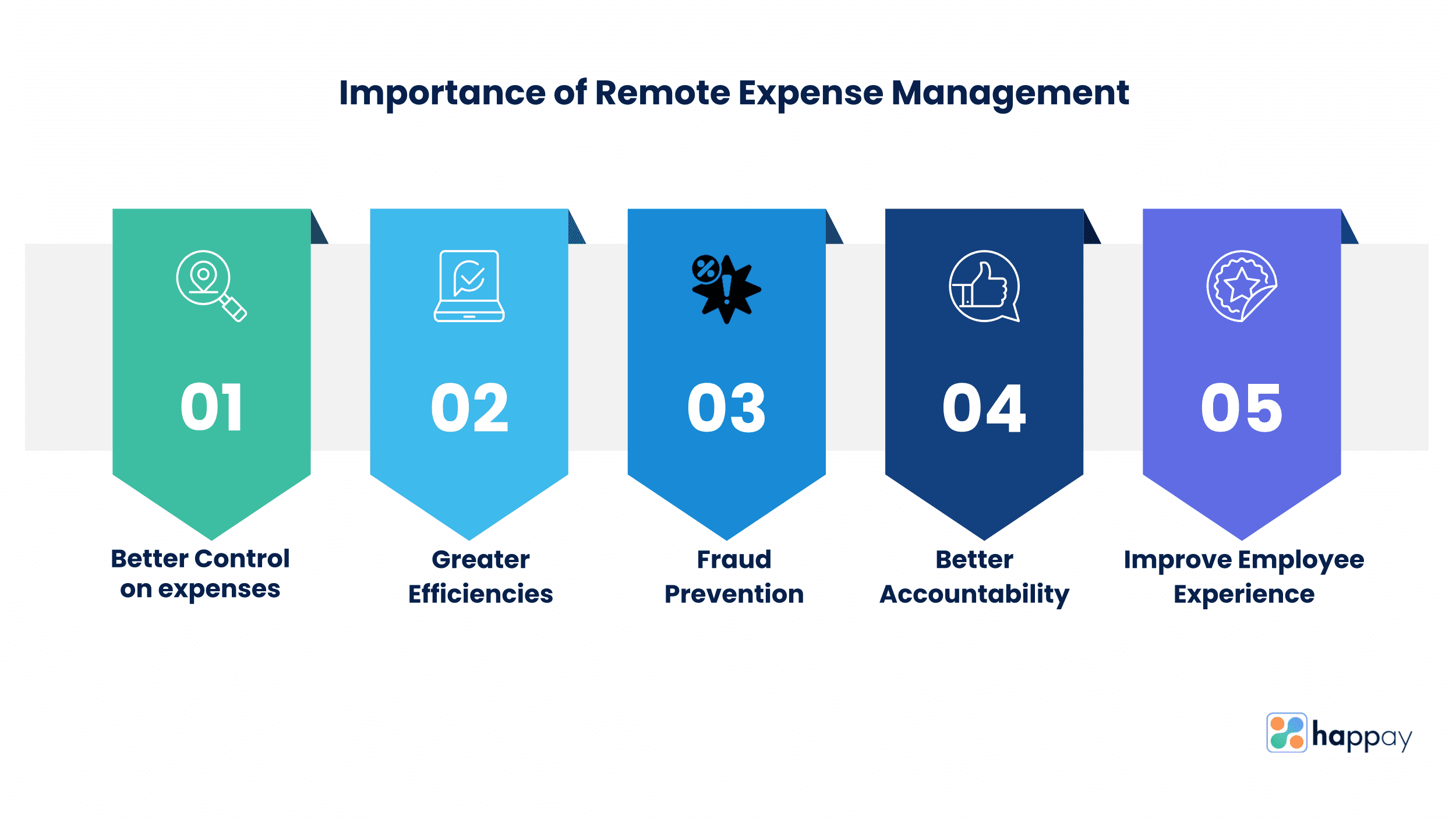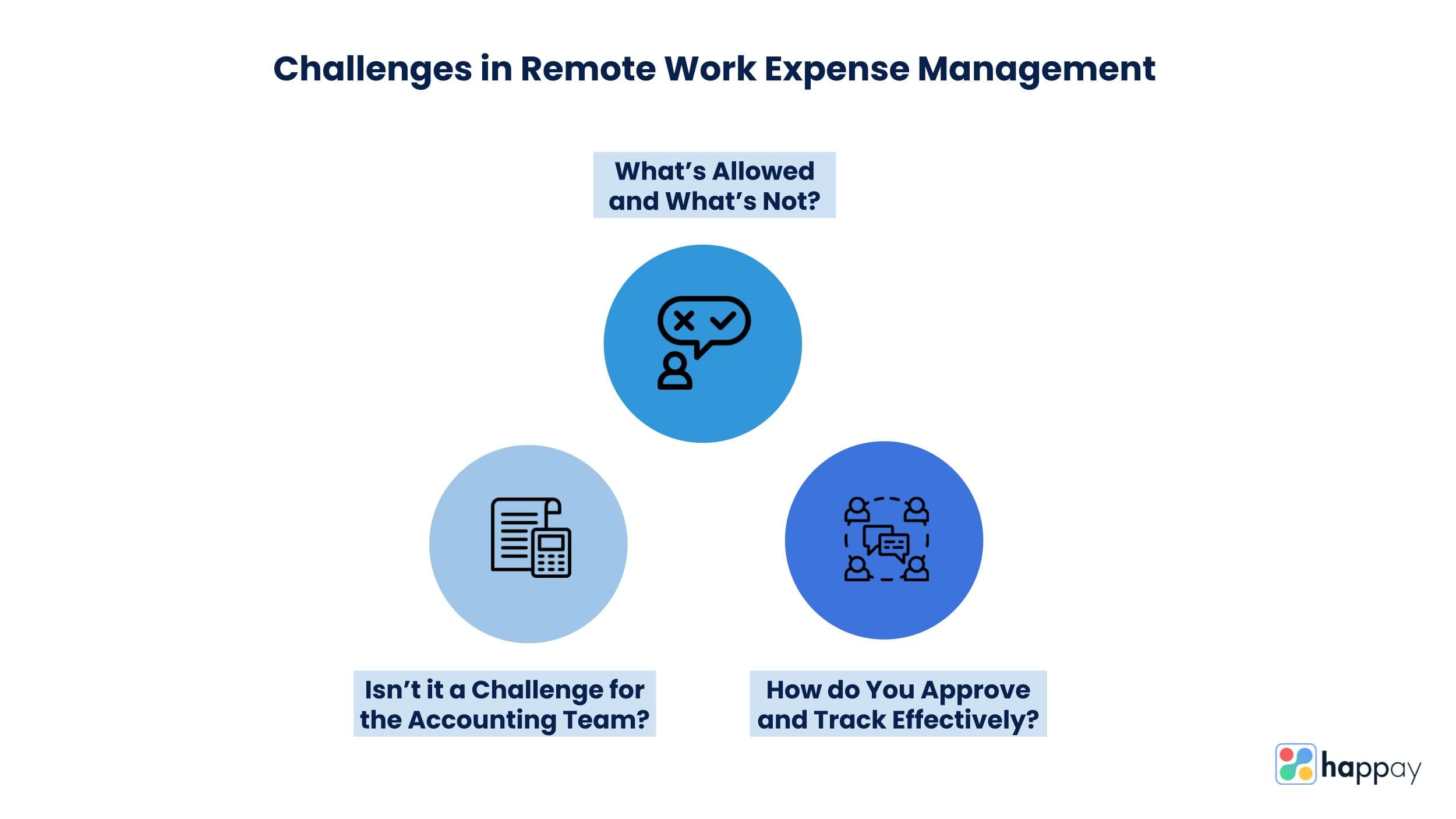According to a report by GetApp identifying workforce trends in the past decade, “remote working habits” are considered one of the most defining techs. Between the rise of SaaS companies, data security, and AI (Artificial Intelligence), remote work has grown by almost 400%.
The covid-19 pandemic pushed a new work culture on everyone. While employees adjusted to a new work environment, employers were forced to redefine operations to suit the new norms. As employees began claiming working from home expenses, organizations began to rework their expense policies to make the transition to remote working hassle-free.
Read further as we understand remote work expenses and explain how it affects your organization and its employees.
What is Remote Working Allowance?
Any costs an employee incurs on behalf of the organization are valid business expenses. Sometimes, employees work out of different locations (other than where the business is situated).
Costs that employees incur while performing their job from home are called remote work expenses. Employees can claim work-related expenses within a specific limit.
Expenses like high-speed internet, a better cellphone, or mobile connectivity are perfect examples of work from home expenses. For clarity, employers may put together a list of expenses that employees can claim under this category.
Types of Remote Work Expense
The 2022 State of Remote Work Report surveyed 2,118 people across 16 countries. Among other observations, 86% of employees favored a completely-remote work environment or a remote-first environment. Further, 72% of employees said their organizations were planning some kind of remote work in the future.
Depending on the place, nature of work, and other factors, remote work expenses may vary. Let us look at some types of costs.
1. Setting up Home Offices
Creating a productive mode is subjective for everyone, but a decent and comfortable workplace is a bare minimum. Many organizations reimburse remote set-ups for employees. The reimbursement amount may depend on several factors, such as employee grade or location.
2. Purchase or Upgrade Electronics
It is impossible to complete a day’s work without laptops, mobile phones, or other technological tools. Whether in the IT industry or otherwise, technological equipment is necessary. Depending on the needs of your employees, you may have to design policies that accommodate such expenses.
3. Internet
As someone said, “That awkward moment when Usain Bolt runs faster than your internet”!
It is impossible to think about working without high-speed internet. Better internet connectivity can be directly associated with improved productivity. Therefore, internet connectivity for your employees working remotely are valid remote work expense.
4. Subscriptions for software
Employees may purchase multiple software subscriptions to improve their productivity. These may be group subscriptions or individual ones. Employees can claim such subscriptions as remote work expenses based on individual needs and approvals from appropriate managers.
Also, Read: Employees Expense Reimbursement Claims
Why is Remote Work Expense Management Necessary?

1. Better Control
An expense management system that covers remote working expenses is comprehensive. It assures finance teams that they are tracking and managing all expenses effectively. Apart from accounts management, cash flows to and from the business are adequately accounted for.
2. Improving Efficiencies
Traditional and paper-based workflows are error-prone and time-consuming. Further, there are practical difficulties with remote work expenses. For instance, employees may find it easier to digitally submit expense proofs and expense claim forms rather than couriering the physical receipts.
Time management is generally an issue but more so for those working from home. Since there are no specific time slots for when they sign in to work and sign out, managing the expense claims can become chaotic and unproductive.
3. Fraud Prevention
While claiming work from home expenses, employees may submit erroneous or fraudulent claims. Cross-checking those expenses means additional effort and cost for organizations. However, automated expense management can help you scale this challenge. Customizing the software to include policies that govern such remote work expenses will ensure that employees claim expenses by the book.
Read More: Prevent Expense Fraud
4. Improve Accountability of Employees
There is a difference between working in the office and working from home. For instance, while you may seek reimbursement for your internet connection, what about utility bills that will undoubtedly be higher? How do you account for that? Similarly, what about your printer costs? Have they been increasing?
If you don’t have a policy for those expenses, then by opting for expense management software, you can get insights into expense claims by remote workers. You can update your travel and expense policy to include remote work expenses based on this information.
5. Better Employee Experience
Stacy Sherman says, “ If you don’t appreciate your employees, your competitors will”!
It is simple. If the employee experience suffers, there will be a gradual increase in the number of people leaving your company for better opportunities. Cumbersome expense claim procedures can be frustrating for employees. The focus shifts from more critical work to saving receipts, filing claims, and couriering them to the office for reimbursements.
Improve the efficiency of your employees by boosting their experience at work.
Ways to Manage the Remote Work Expenses
1. Track, Account, and Reimburse Remote Work Expenses with Expense management system
Buffer’s State of Remote Work, 2022 states that only about 77% of organizations have systems or technology that support remote team collaboration and communication. With so many organizations supporting remote working, don’t you think you should get on the tech bandwagon?
Claiming remote work expenses must be easy and efficient for employers and employees. Irrespective of your employees’ time zone or physical location, employees must be able to claim expenses hassle-free.
Further, employers must do away with spreadsheets and every other manual process to manage this process through customized expense management software. The advantages it offers:
a) Track – The process is streamlined and provides a more structured and straightforward way to track and manage expenses. Expenses can be captured automatically through an app which is available to all stakeholders in real-time.
b) Accounting – Automation allows finance teams to view and track transactions in real time. Approvals are quick; therefore, data entry and reconciliations are far more accurate and quick. You can adhere to timelines far more effectively with expense management software working for you.
c) Reconciliations – With the right expense management software, you do not have to worry about integrations. Data entry is seamless, and accounts are reconciled automatically. You have 100% visibility and control over your expenses.
Also, Read: Expense Reconciliation
2. Dedicated Remote Work-Cards
Virtual cards or dedicated corporate cards are an excellent option to control remote work expenses better. There is an audit trail, and corporate cards with predetermined spending limits ensure employees spend only the permissible amount.
Another plus point of such an arrangement is that employees do not have to deal with approval delays.
3. Track and Manage Remote Expenses Periodically
If you do not have an automated expense management system in place, the next best thing to do would be to ensure that you manually track and manage such remote expenses periodically. Communicate well and often, so your employees understand the importance of timely expense claim submissions. Reconcile often and take immediate action to avoid time delays in identifying errors, frauds or reimbursements.
4. Invoice Management Software
Accounts payable or payments for such remote work expense claims can be handled by opting for invoice management software. To begin with, the software will document and organize the information so you can track it better. Remote work expenses are just one part of the payments, as the software can easily organize and digitize all your payments.
Also, Read: 7 Steps to Track Your Business Expenses
Challenges in Remote Work Expense Management
While most organizations have accepted the reality of remote working, there are numerous challenges. Let us look at some of the most pressing ones.

1. What’s Allowed and What’s Not?
Several factors influence the list of claimable or non-claimable expenses. While the most obvious ones are the seniority of the employee or department, the tax deductibility of the expense also influences this decision.
Since the list of allowable expenses varies greatly, travel and expense policies that clarify your position is critical. Also, it is essential to elaborate further by providing examples. It removes ambiguity and ensures you control the number of non-compliant remote work expense claims as best as possible.
2. Approval and Tracking
Approvals for remote work expenses can become challenging. While emails are the easiest and the first thing employees resort to, it is often time-consuming.
- Depending on the number of approvals and the urgency, it can become quite a stress-inducing task for the accounting department.
- Traveling or busy managers may delay the approvals leading to operational chokes and a point of frustration for employees.
- Time delays affect reimbursement turnaround time leading to annoying wait times.
The multiple bank accounts, card statements, and numerous other spreadsheet-based calculations can result in long hours of reconciliations for the accounts department.
3. Accounting Challenges
Traditionally, accounts teams have always worked manually using paper-based processes or spreadsheets. However, errors and frustrating delays compel you to look beyond. Digitizing the process with expense management software can help streamline the process. Customizing the software to suit your requirements is an added advantage.
Also, Read: A Guide to Simplify Your Expense Reimbursement
Streamline Your Remote Work Expenses with Happay Expense Management Software
Happay is the most flexible and comprehensive solution for expense management. In comparison, we feature the highest number of integrations and support even the most complicated workflows and policies logic.
Here’s a look at how you can benefit.
- Customized travel requisition forms that ease travel planning woes by facilitating online travel planning.
AI-enabled expense capture feature allows effortless management and reporting of expenses. - Real-time access makes approvals easy and quick. Managers can track and approve expense claims instantly.
- Automatic settlement results in quicker reimbursements, better employee experiences, and faster reconciliations.
- With the automated transfer of expense data into the accounting software system, integration is smooth and easy.
- A high-level and granular breakdown of travel and expense data is available for more intelligent decision-making.
Call or schedule a demo with us to learn more about what Happay can do for you.
Conclusion
Remote work expense management is often misunderstood as complex or elaborate. However, this process can become structured with the right expense management software and bring more value to your organization.
Finance teams will benefit from a customised software solution, whether it is expense capture, tracking, or overall management of such remote expenses.
FAQs
1. How do companies benefit when employees work remotely?
Employees who work remotely may be inclined to begin work quicker or be motivated to work harder as they work in the comforts of their homes. Similarly, organizations may find that they can save on several costs they would otherwise incur when they host employees at the office.
2. What are the best ways to manage your employees’ remote work expenses?
The best way to manage remote work expenses is to employ technology. Automated expense management systems can help employees capture expenses while employers can easily track and manage them to reimburse employees efficiently and on time.







